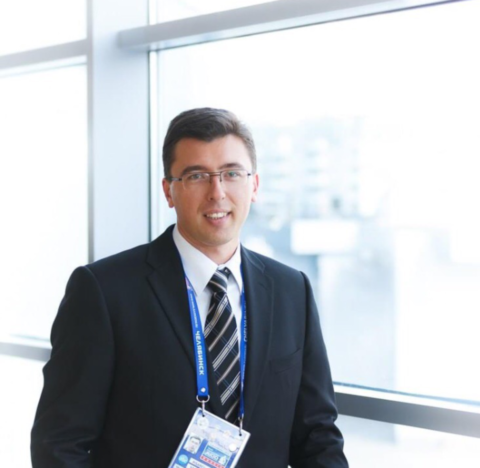The Institute of Linguistics and International Communications of South Ural State University under the auspices of the Association of Translation Teachers continues a series of events aimed at developing the field of translation, increasing the prestige of the translation professions, and cooperation in training and proficiency enhancement among translators and teachers of translation.
As part of its activities, a series of workshops were held with a practicing translator, Candidate of Sciences (Pedagogy) Yaroslav Pisarev, who shared his experience of working with students and teachers.
Yaroslav Pisarev is engaged in interpretation and translation, has extensive experience in projects of the international and all-Russian level, such as the Olympic Games in Sochi, the Moscow International Film Festival, the world championships in football, taekwondo, judo, dance sports, curling, and hockey. He worked at the Universiade in Kazan, at the Skolkovo Business School, prepared presentations about the Chelyabinsk Region.
Teachers and student translators, regional experts, specialists in the field of international relations, as well as those who are engaged in the development of translation activities in the framework of vocational education were among the participants of the workshops.
“Such workshops are important since they help you to find your niche in the variety of translation projects, highlight the problems and prospects in the work of a translator, prepare for work as an interpreter and a translator,” noted the organizer of the meetings, Director of Institute of Linguistics and International Communications Elena Yaroslavova.
The participants were especially interested in extraordinary cases from the translation experience. The future translators acted both as students and experts: they learned first-hand what happens behind the scene of the translation process; and they also tried their hand at interpreting.
Yaroslav Pisarev shared his understanding of the profession of a translator and the importance of such meetings for the future specialists in translation and intercultural communication:
“I believe it is extremely important to complement the basic theoretical competencies with interaction with professionals. Such open lectures and trainings help students to prioritize, see additional aspects of the profession, promote immersion in a professional environment, and increase motivation.”
The reviews of students who have visited the workshops also speak about the need to organize such meetings:
“This workshop is very useful. The speaker has analysed the most common mistakes using his own examples. The photo and video materials have clearly illustrated the activity from the practical side. It was interesting to see the examples of shorthand writing made during consecutive interpreting at a sports press conference.”
“The meetings turned out to be very interesting and informative especially for those who want to translate professionally.”
“Using his own mistakes as an example, the speaker sorted out some of the challenges of translation and shared the secrets of successful interpreting openly and with humour. Thanks for that!”
The listeners not only positively assessed the experience gained, but also expressed a desire that such events continue on the topics of the “Peculiarities of political negotiations”, “Pros and cons of the profession of a translator”, and “How to cope with anxiety during interpreting”.




